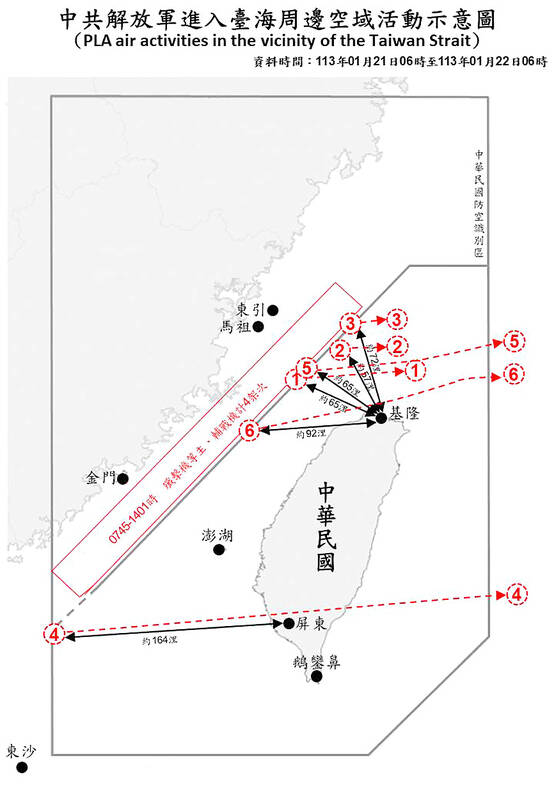The balloons that China has been floating over Taiwan are an attempt to determine the positioning of air defense units by luring them into opening fire, an academic said in a cross-strait situation brief published by the Mainland Affairs Council.
Balloons have limited ability to contribute to military operations, but are suited to “gray zone” tactics, said Lin Ying-yu (林穎佑), an assistant professor of international affairs and strategic studies at Tamkang University.
Although they lack offensive capabilities and cannot be steered, they are a symbol of Chinese state control and apply political pressure without being excessively provocative, Lin said.

Photo courtesy of the Ministry of National Defense
Taiwan’s armed forces have not shot down any of the balloons, despite having the capability, likely due to cost concerns, as air defense missiles are expensive, he said.
Beijing’s use of balloons in the winter — apparently to harness seasonal winds — serves a dual purpose of scientific research and intelligence gathering, he said.
Should Taiwanese units be provoked into firing at the balloons, Beijing would be able to glean valuable information about the position and operating procedures of launch sites to use in plans for a hypothetical invasion, Lin said.
Moreover, floating balloons over Taiwan proper is a symbolic display of China’s ability to exert air control that discredits the government in Taipei as being unable to mount an effective defense of its sovereign airspace, he said.
The use of balloons is concurrent with new developments in Chinese cognitive warfare techniques, which increasingly make use of propaganda videos that emphasize China’s military power while downplaying Taiwan’s, he said.
Taipei’s apparent inability to deal with the balloons was featured prominently in these videos, he added.
The use of balloons in Beijing’s harassment of Taiwanese airspace is mainly conducted for its political effect and not to gain a military advantage, Lin said.

Taipei and New Taipei City government officials are aiming to have the first phase of the Wanhua-Jungho-Shulin Mass Rapid Transit (MRT) line completed and opened by 2027, following the arrival of the first train set yesterday. The 22km-long Light Green Line would connect four densely populated districts in Taipei and New Taipei City: Wanhua (萬華), Jhonghe (中和), Tucheng (土城) and Shulin (樹林). The first phase of the project would connect Wanhua and Jhonghe districts, with Chiang Kai-shek Memorial Hall and Chukuang (莒光) being the terminal stations. The two municipalities jointly hosted a ceremony for the first train to be used

MILITARY AID: Taiwan has received a first batch of US long-range tactical missiles ahead of schedule, with a second shipment expected to be delivered by 2026 The US’ early delivery of long-range tactical ballistic missiles to Taiwan last month carries political and strategic significance, a military source said yesterday. According to the Ministry of National Defense’s budget report, the batch of military hardware from the US, including 11 sets of M142 High Mobility Artillery Rocket Systems (HIMARS) and 64 MGM-140 Army Tactical Missile Systems, had been scheduled to be delivered to Taiwan between the end of this year and the beginning of next year. However, the first batch arrived last month, earlier than scheduled, with the second batch —18 sets of HIMARS, 20 MGM-140 missiles and 864 M30

Representative to the US Alexander Yui delivered a letter from the government to US president-elect Donald Trump during a meeting with a former Trump administration official, CNN reported yesterday. Yui on Thursday met with former US national security adviser Robert O’Brien over a private lunch in Salt Lake City, Utah, with US Representative Chris Stewart, the Web site of the US cable news channel reported, citing three sources familiar with the matter. “During that lunch the letter was passed along, and then shared with Trump, two of the sources said,” CNN said. O’Brien declined to comment on the lunch, as did the Taipei

A woman who allegedly attacked a high-school student with a utility knife, injuring his face, on a Taipei metro train late on Friday has been transferred to prosecutors, police said yesterday. The incident occurred near MRT Xinpu Station at about 10:17pm on a Bannan Line train headed toward Dingpu, New Taipei City police said. Before police arrived at the station to arrest the suspect, a woman surnamed Wang (王) who is in her early 40s, she had already been subdued by four male passengers, one of whom was an off-duty Taipei police officer, police said. The student, 17, who sustained a cut about